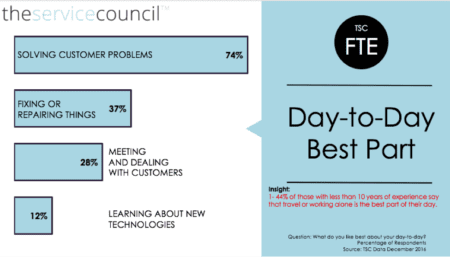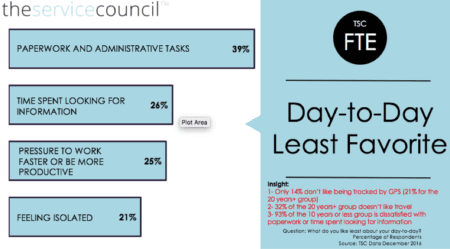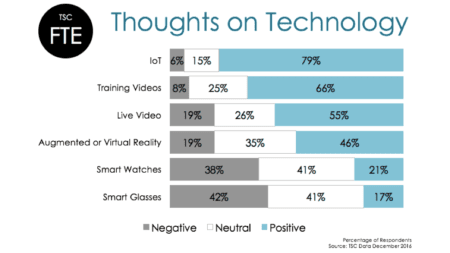Bill Gates once famously quipped, “Your most unhappy customers are your greatest source of learning.” This is a powerful lesson for field service leaders, and one that should be extended to internal customers as well. For field service leadership, front-line field service engineers are the most important internal customers.
In 2016, The Service Council embarked on a set of research surveys to poll front-line field service engineers in North America. The surveys were aimed at understanding engineers’ perceptions of their profession and their feedback on available field service technology. The enthusiastic participation prompted us to extend the survey to field service engineers in Europe. We surveyed nearly 60 service engineers with varying levels of experience across Europe.
While there were several insightful takeaways from the surveys, let’s focus on the most significant findings.
Favorite Part of the Job? Problem Solving
As in the case in North America, our European participants indicated that they enjoy working with customers and solving their problems. It’s not just the technical aspect of fixing, repairing or installing, but the pride that comes with supporting customer needs that drives the greatest level of affinity for the field service profession.

Image: The Service Council
Least Favorite? Paperwork
When we flipped the script, we found that there is a general dislike of activities that take engineers away from solving customer problems. Day-to-day, this involves the frustration tied to paperwork or in looking for pertinent information to successfully accomplish service tasks. It would seem surprising that, in the age of field service automation and mobility, paperwork and administrative tasks that would seem easily automated continue to plague field service engineers.

Image: The Service Council
Bullish on New Technologies
In the rush to evaluate new tools and technologies that promise to enhance field service performance, it is essential to get direct feedback from those who are most impacted by technology. While we might assume that smart glasses or smart watches are game changers in field service, this might not be the reality reflected by the current field service workforce.
In general, those who are newer to the field service workforce have a positive outlook on new technology tools. But across the board, we find positive sentiment toward tools that provide real-time (or near real-time) performance support. In these areas, tools and solutions around the Internet of Things or live video offer field engineers valuable information to solve customers’ problems. Further strengthening the case for decision and performance support tools, we see a positive reception toward on-demand training content that engineers can consume when and where they need it.

Image: The Service Council
What’s the lesson to be learned here? If we truly believe that our service engineers are valuable resources who have a significant impact on customer satisfaction and loyalty, then we need to work to remove the barriers that prevent them from getting the job done. This doesn’t always require an expensive technology investment; in some instances, it could be quite the opposite, especially if engineers view new automation tools as a compliance headache — or a non-value-added chore.
Another lesson: Field service organizations — in Europe and around the world — benefit from opening greater learning and development and career opportunities to their service engineers. These will not only help them acquire the necessary tools to effectively perform their work, but will also increase their level of engagement and loyalty to the company’s mission. An engaged service workforce that is in constant touch with the customer can also be a great source of learning — and a breeding ground for service innovation.


Asking those at the grass roots how they feel about technology and digitization of their jobs is just about the smartest thing we can do! Putting human experience as a key metric for digital projects is key and this clearly shows that field related problem solving and reducing administrative paperwork is a good motivator.
thanks for the useful survey @SamairDutta